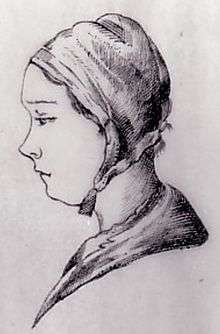Catherine Payton Phillips
Catherine Phillips, born Payton (16 March 1727 – 16 August 1794) was a Quaker Minister, who travelled in England, Wales, Scotland, Holland and the American colonies. Her Christian name is sometimes spelt "Catharine".

Biography
Catherine Payton was born at Dudley, Worcestershire, the daughter of Henry Payton (1671–1746), and his second wife, Ann (c.1673–1774), daughter of Henry and Elizabeth Fowler of Evesham. She did not attend school until her late teens but studied and read widely, at home. She spent much time reading to her paralysed father.
She was recognised as a Minister at Dudley Meeting around 1748, and soon started her many travels, which included a long period in the American colonies.
Catherine Payton met William Phillips, a copper agent[1] and widower, in 1749 but did not marry him until 1772, when she moved to his home in Redruth, Cornwall.
She died on 16 August 1794 and was buried at the Quaker Burial Ground, Come-to-Good, in the parish of Kea, near Truro. Her stepson, James Phillips, a Quaker printer, published her Memoirs and some other writing after her death. James's sons, Richard Phillips (1778–1851) and William Phillips (1775–1828) were Fellows of the Royal Society.
Publications
- An Epistle to Friends in Ireland [on vital religion], Dublin, 1776.
- To the principal inhabitants of the County of Cornwall ... about to assemble at Truro, ... on the mining concerns of this county [urging the formation of "a code of moral stannary laws," etc.]. (Redruth, 6th of the 12th month, 1791.).
- An address to the principal inhabitants of the county of Cornwall who are about to assemble at Truro ... on the mining concerns of that county, 8 pages. J. West: Stourbridge, 1792 [2]
- Considerations on the Causes of the High Price of Grain . . . with occasional remarks 1792.
- Reasons why the People called Quakers cannot so fully unite with the Methodists in their Missions to the Negroes in the West India Islands and Africa as freely to contribute thereto London, 1792.
- To the lower class of people in the western part of the county of Cornwall, J. Phillips: London, 1793, 8 pages.[2]
- The Happy King, a Sacred Poem, with occasional remarks. Respectfully addressed to George III privately printed, 1794 [against Slavery].[2]
- Memoirs of the Life of Catherine Phillips, to which are added some of her Epistles London, James Phillips, 1797.[3]
- Some of her discourses are appended to those of Samuel Fothergill in Some Discourses, Epistles and Letters by ... S. Fothergill, etc. London, James Phillips, 1803:
- Discourse delivered at Fryar's Meeting House, Bristol 5th of Fifth Month 1779 p. 149–171
- Prayer: discourse delivered at Westminster 5th Month 19th, 1782 p. 172–176
- A Discourse at the Meeting-House in Westminster 17th of the 5th Month 1780 p. 177–195.[4]
- Some letters are printed in John Kendall's Letters on Religious Subjects by divers Friends deceased 1805, Volume 2.[5]
- According to the Gentleman's Magazine obituary (1795), "Mrs. Phillips is said to have had considerable knowledge in medicine and botany, and to have published something on planting and beautifying waste grounds,' but no such work appears to be known".[6]
References
- Sources
- Catherine Phillips Memoirs of the Life of Catherine Phillips, to which are added some of her Epistles London: James Phillips, 1797.[3]
- ODNB article by Gil Skidmore, 'Phillips, Catherine (1727–1794)', Oxford Dictionary of National Biography, online edn, Oxford University Press, Sept 2004 accessed 24 June 2010.
- Rebecca Larson Daughters of Light: Quaker Women Preaching and Prophesying in the Colonies and Abroad, 1700–1775, New York: Alfred A Knopf, 1999 ISBN 0-679-43762-2. Paperback edition – University of North Carolina Press (September 2000): ISBN 978-0-8078-4897-5.
- Dictionary of Quaker Biography (typescript) at Friends House, Euston Road, London NW1 2BJ: articles on Catherine and William Phillips.
- The Gentleman's Magazine 1795, i. 259 "Obituaries of remarkable persons; with biographical anecdotes: available online at GoogleBooks
- Boase and Courtney's Bibliotheca Cornubiensis Volume 2, pp. 479–480: Lists of Catherine Phillips writings. This source is available online at Internet Archive.
- British Library integrated catalogue
- "The later years of Catharine Phillips" by A. G. K. Leonard in Friends Quarterly Vol. 11, No. 2 (April 1957), p. 91–94.
- Notes
- A Copper Agent managed a copper mine in Cornwall.
- "The later years of Catharine Phillips" by A.G.K. Leonard in Friends Quarterly Vol.11, No.2 (April 1957), pp91-94. Leonard discusses the content and context of this pamphlet.
- Two copies of this work are available free of charge online: University of Wisconsin-Madison on GoogleBooks and Princeton at Internet Archive.
- Some discourses . . Samuel Fothergill is available online at GoogleBooks – at pp.147 to 195
- John Kendall – ODNB article by David J. Hall, 'Kendall, John (1726–1815)', Oxford Dictionary of National Biography, Oxford University Press, 2004 accessed 20 Sept 2010
- For Gentleman's Magazine reference, See Sources above.